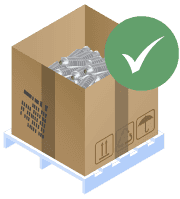Converter Sourcing
Catalytic Converter Theft and Responsible Sourcing: An Overview from a Recycler's Perspective

Catalytic converter theft and responsible sourcing have become hot topics in recent times, especially in the scrap and recycling industry. This article examines the issue of converter theft and responsible sourcing from a recycler’s standpoint and explores the impacts on the industry.
What drives converter theft?
Two primary factors contribute to converter theft. First, the rising prices of precious metals make converters highly valuable when recycled. The average recycled value of a converter was $50 to $60 USD three years ago, while the recent average value has been around $150 USD per unit. Second, easily accessible online information that provides guides to the recycled value of converters has led to an increase in theft.
What are the impacts of stolen catalytic converters on the recycling industry?
Currently, the impacts on the industry are not significant, thanks to legitimate recyclers who source material from end-of-life vehicles and cars/light trucks bought at auction for parts. While converter theft is an issue, the number of stolen units do not make up even a fraction of the millions of converters recycled annually in North America and the rest of the world.
The real impact that converter theft is having on some recyclers depends on state and municipal laws and regulations being developed and implemented surrounding the sale of scrap converters. For now, there is quite a patchwork of regulations that, in some states/counties, have severely restricted the sale of converters to recyclers from the public. While this is a politically expedient solution, all it really does is drive the sale of converters to illegitimate buyers or has the public travelling to states or counties that don’t have the same restrictions.
From the standpoint of legislation, until there is some sort of nationally standardized practice, the patchwork of laws and regulations will not be overly effective in combating converter theft. As mentioned above, thieves looking to sell stolen material will either sell to illegitimate buyers or travel to states and counties that have fewer or no restrictions for the sale, but this type of response has a limited impact on the overall converter recycling industry.
What can recyclers do to prevent the sale of stolen converters?
Recyclers running legitimate businesses should record information from people selling them converters and ask for vehicle registrations to prove proper ownership. Alternatively, sellers should have a work order from a mechanic stating the converter was removed from their car because it failed an emissions test and required replacement.
PMR offers recyclers electronic means of identification that can assist with confirming make and manufacturer of a scrap converter while keeping a photo record that can be adapted to responsible sourcing practices. If someone is not able to prove ownership of the vehicle a converter came from or does not participate in legitimate automotive recycling, then the units should not be purchased, and the authorities should be notified of any suspicious activity.
What is responsible sourcing, and how can it help prevent converter theft?
Responsible sourcing is the practice of procuring raw materials and ensuring goods are manufactured in an ethical and sustainable manner. Recyclers can also implement responsible sourcing practices to prevent stolen converters from entering their facilities.
Red flags for stolen converters include people who come in with newer converters without proof of ownership or an invoice from a licensed mechanic stating the converter was replaced. Another red flag is potential sellers with no history or connections to dismantling cars, only converters to sell, or with unrealistic expectations for the value of scrapped units. Such sellers will insist on cash transactions and have no willingness to provide identification. Recyclers can also work with their suppliers, ensuring they have a registered business and comply with state laws while committing to responsible sourcing practices.

Converter theft is an ongoing issue, and until there are nationally standardized practices, it will not be effectively combated. However, PMR is committed to offering resources to their suppliers that comply with state laws, assist in identifying converter types, and work only with legitimate recyclers who are committed to the communities they serve. Recycling catalytic converters is essential to reducing carbon emissions and climate change, and responsible sourcing practices can help maintain a positive business reputation.

